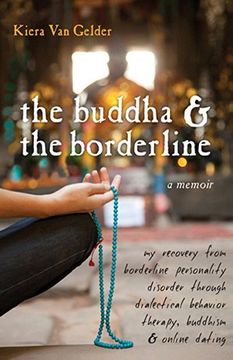The Counselor's Bookshelf:
|
 I can't remember how I heard about this book. I think it showed up while searching online for something else. Regardless, I bought it on a whim and put it on my Books-To-Read pile. When I finally picked it up, I was hooked by the first page. In honest, compelling, and remarkably lucid language, Keira Van Gelder tells the story of her evolution from self-proclaimed "mentally ill, suicidal drug addict" to grounded, self-aware, hopeful, connected woman. The book is sometimes fun to read, and sometimes hard. She doesn't pull any punches as she shares candidly about suicide, self-harm, anger, depression, overwhelm, broken relationships and powerlessness. Her experience navigating the mental health system is challenging, and even harrowing, until she finally finds a diagnosis, treatment center, and modality that fit her needs. Most importantly, Keira's story shines a very human light on the possibility for recovery from one of the most feared and stigmatized mental illnesses: borderline personality disorder. Here's an excerpt: In DBT group Simon explains that emotions serve a purpose. "Despite how horrible they feel or how much trouble they seem to cause, they do important things for us: They communicate. They motivate. They self-validate. They give our lives richness and meaning." As the season turns, I try to find meaning in my intense loneliness without concluding that I'm a pathetic loser. My work at the office remains steady, challenging, exhausting, and occasionally satisfying. My walks to work become my mindfulness practice.
0 Comments
I recently stumbled upon this article by Carolina Gonzáles in the On Being blog. It talks about the decision to have children, or not, and also about the roles we play in our extended families given those decisions. She looks at assumptions we have about what the nuclear family consists of in the United States, and in her native country of the Dominican Republic where family lines extend well beyond the immediate family. We are moving out of a period in history when having children is expected if you have a partner and the biological ability, and into one in which we can choose to be parents, to adopt, foster, or otherwise play supportive roles (or not) in the lives of the next generation. I appreciate this thoughtful, expressive and honest piece about the bittersweet nature of the decisions we face today, and the ways we can and can't be there for each other as we create 21st century families.
Here's an excerpt from Carolina's essay: In mainstream U.S. culture, aunts and uncles have no special status. The focus is on the sanctity of the nuclear family, with some indulgence granted to grandparents and their doting. |
The Counselor's Bookshelf:Sharing the books, articles, podcasts, and other resources I'm drawing from personally, and in my work as a counselor. Archives
October 2019
Categories
All
|
Proudly powered by Weebly
 RSS Feed
RSS Feed